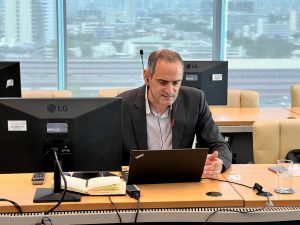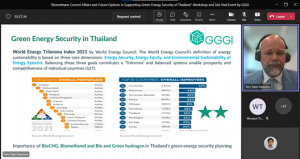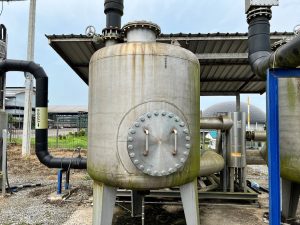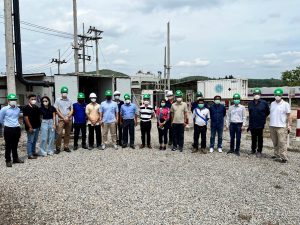April 4-5, 2022; Bangkok, Thailand – The Global Green Growth Institute (GGGI) organized a workshop “Biomethane Current Affairs and Future Options in Supporting Green Energy Security of Thailand’’, which sets out to enhance understanding of key stakeholders in Thailand on the current status and future potential of BioCNG and related biomethane applications.
This engaging event brought together key stakeholders to share and learn about BioCNG and related biomethane applications in Thailand. The event facilitated open dialogue on the potential investments and policy adjustment needed to further accelerate the sector, provided a platform to discuss the next steps for BioCNG, including the policy and regulatory environment to facilitate sustainable BioCNG investment, and raised awareness about the environmental, economic, and social benefits of biogas applications.
Ms. Nareerat Panmanee, Director of Climate Change Management and Coordination Division, the Office of Natural Resources and Environmental Policy and Planning, gave an opening speech emphasizing country’s priority on climate change. She stated, “Thailand has announced its NDC to reduce 20-25% GHG emission in transport and energy, waste, and industry sectors by 2030, and recently announced country’s higher ambitious targets in striving to reach carbon neutrality by 2050 and net zero emissions by 2065”. She also mentioned that green investment, particularly, BioCNG, will contribute to green jobs and Thailand’s climate targets.
Mr. Pajon Sriboonruang, President of the Thai Biogas Trade Association, emphasized that “Thailand relies heavily on imported energy, BioCNG and biomethane applications is a key to enhance Thailand’s energy security. With carbon credit market under Article 6 of the Paris Agreement and the upcoming implementation of the Carbon Border Adjustment Mechanism, global manufacturing companies in Thailand has expressed their interest and demand for renewable energy and green fuels. In addition, the Federation of Thai Industries joined hands with the Provincial Electricity Authority to implement a pilot project on clean energy and carbon credit trading platform which will help to encourage renewable energy development including BioCNG and biomethane applications in the Thai industrial sector.”
Mr. Tero Raassina, Thailand Country Representative, the Global Green Growth Institute, explained that “to promote green investment in retrofitting biogas to BioCNG, GGGI is supporting Thailand in establishing Thailand Circular Economy Financing Facility (T-CEFF). The objective is to provide systematic and scalable green finance solution to accelerate Thailand’s circular economy transition. TCEFF will use blended finance instruments and mechanisms to mitigate access-to-finance barriers. Through T-CEFF, the private sector SME-size and middle market project developers receive financing at relatively low costs or at the better terms.”
Following the event, 18 participants from biogas developers, and BioCNG and biomethanol offtake companies joined a BioCNG project site visit at the Center for Compressed Biomethane Gas Model and Technology Transfer in Sai Thong, Bang Saphan Noi, Prachuap Khiri Khan province on 5th April. The purpose of the site visit was to showcase the solutions for retrofitting biogas plants to enables the production of BioCNG and to enhance a dialogue with the key stakeholders.
Retrofitting biogas plants that do not produce electricity at the full bioreactor capacity enables the production of BioCNG which can cost competitively replace CNG and LPG for the transport and industrial applications. Other ambitious pathways are the production of biomethanol from biogas to replace fossil methanol imports, starting with an industrial-scale pilot project. Finally, two longer term approaches are proposed: BioCNG to be used to generate electricity for electric vehicle charging, and biomethane injection and blending to the gas grid to be supported by the Green Gas Certification Scheme.



